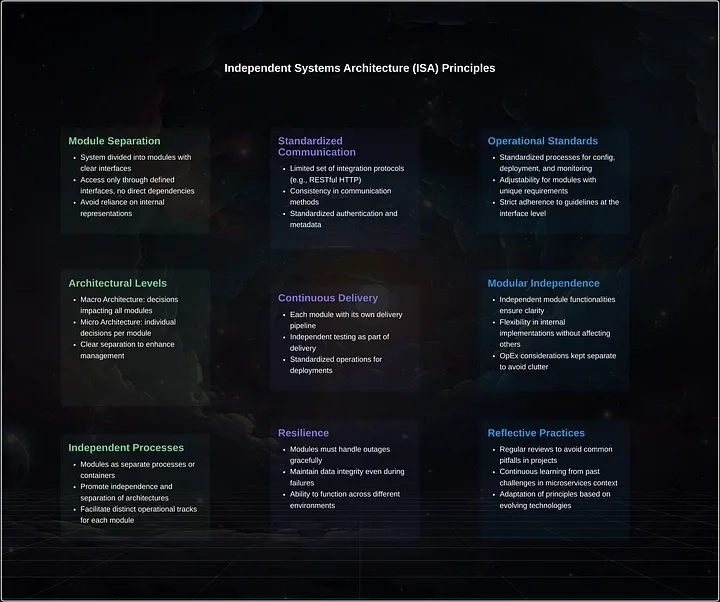Software architecture often struggles with tight coupling, dependency issues, and inflexible designs, making it difficult to scale and adapt. Independent System Architecture (ISA) principles provide a solution by promoting modularity, resilience, and independence between system components.
To illustrate these principles in a practical, real-world scenario, we present them as The Ten Commandments of ISA, each demonstrated through the Smart Parking System — a modern solution that helps drivers find, reserve, and pay for parking spaces efficiently.
1st Commandment: Thou Shalt divide The System Into Independent Modules
𓀃 Principle: A system must be composed of independent modules that interact only through defined interfaces. No module should rely on another’s internal implementation details.
🅿️ Smart Parking Example:
- The Parking Availability Module (sensors and cameras) does not directly access the Payment Module’s database. Instead, it communicates through an API, ensuring independence.
- This allows parking availability logic to evolve without breaking the payment system.
2nd Commandment: Thou Shalt Separate Macro & Micro Architecture
𓀃 Principle: Architectural decisions must be divided into two levels:
- Macro Architecture: Rules that apply to all modules (e.g., using synchronous or asynchronous communication, Standardized documentation, Authentication, Integration testing…etc).
- Micro Architecture: Decisions made within each module (e.g., programming language, database choice).
3rd Commandment: Thou Shalt Deploy Modules as Separate Processes or Containers
𓀃 Principle: Each module should be deployed as a separate process, container, or virtual machine to ensure isolation and independence.
🅿️ Smart Parking Example:
- The Parking Availability Service, User Management, and Payment Processing run in separate Docker containers, ensuring that a failure in one service does not crash the entire system and why not zero downtime within Kubernetes cluster.
4th Commandment: Thou Shalt Standardize Integration and Communication
𓀃 Principle: The system must use a limited, standardized set of communication protocols, either synchronous (REST, gRPC) or asynchronous (Kafka, RabbitMQ).
🅿️ Smart Parking Example:
- The system enforces RESTful APIs with JSON payloads for synchronous interactions.
- Asynchronous event-driven communication is used for sensor updates (e.g., a Kafka event notifies when a parking spot is occupied).
5th Commandment: Thou Shalt Standardize Metadata
𓀃 Principle: Metadata such as authentication, traceability, and logging identifiers must be standardized across all modules.
🅿️ Smart Parking Example:
- All API requests include a JWT token for authentication, ensuring that users don’t need to log in separately for different services.
- Each request carries a trace ID, allowing the system to track transactions across microservices.
6th Commandment: Thou Shalt Give Each Module Its Own Continuous Delivery Pipeline
𓀃 Principle: Each module must have an independent CI/CD pipeline and be tested separately to ensure modular development.
🅿️ Smart Parking Example:
- The Payment Service and Parking Sensor Service have separate CI/CD pipelines, allowing them to be updated or fixed independently.
- Automated unit and integration tests ensure that new updates do not break existing functionality.
7th Commandment: Thou Shalt Standardize Operations
𓀃 Principle: Configuration, deployment, log analysis, tracing, monitoring, and alerting must be standardized to simplify management.
🅿️ Smart Parking Example:
- All services use Kubernetes for deployment, Prometheus for monitoring, and ELK Stack for log analysis.
- If a service fails, automated alerts notify DevOps teams to investigate.
8th Commandment: Thou Shalt Enforce Standards at the Interface Level
𓀃 Principle: System-wide standards must be enforced at the interface level, allowing flexibility inside each module.
🅿️ Smart Parking Example:
- Every module must expose a RESTful API using JSON for data exchange. The backend team is free to use different programming languages (Python, Java, Node.js) inside their modules, as long as they comply with the API contract.
9th Commandment: Thou Shalt Make Modules Resilient
𓀃 Principle: Modules must handle failures gracefully, compensating for downtime and network issues.
🅿️ Smart Parking Example:
- If the Payment Service is down, users can still reserve a parking spot, and payment retries are queued for later processing.
- A circuit breaker pattern prevents repeated failures from overwhelming the system.
10th Commandment: Thou Shalt Allow Modules to Be Moved and Scaled
𓀃 Principle: Modules must be designed to be migrated across different environments without breaking.
🅿️ Smart Parking Example:
- The Smart Parking System can be deployed on AWS, Google Cloud, or on-premise with minimal changes.
- Auto-scaling ensures that when traffic increases, new instances of the Parking API are spun up automatically.
How could your next software project benefit from ISA principles? Let’s discuss in the comments! ☺️




Top comments (0)